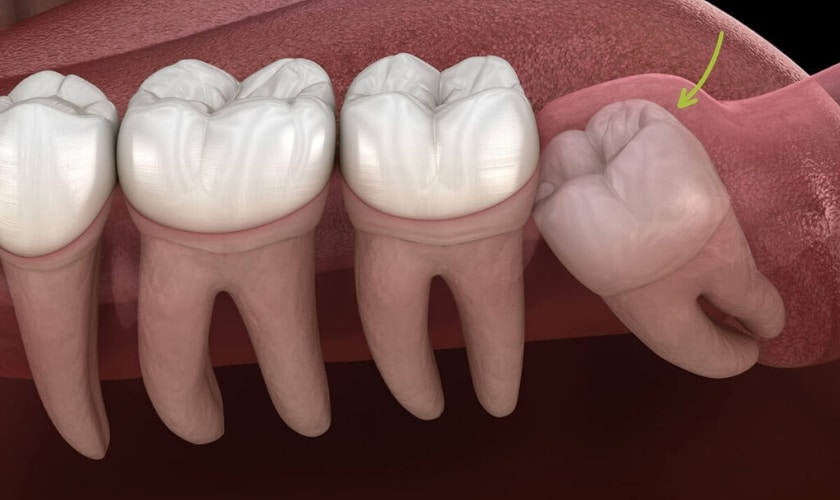This blog article discusses the dangers associated with wisdom tooth extraction, a surgery usually carried out by orthodontists between the ages of 17 and 25. It also goes through other possibilities, determining whether an orthodontist can conduct extractions and other risks.
Alternatives To Wisdom Teeth Extraction By An Orthodontist
Wisdom tooth extraction is frequently seen as the recommended course of action. Sometimes, an orthodontist will consider non-surgical measures before removing a tooth. Let’s examine a few of these substitutes.
- Monitoring: Your orthodontist may advise routine dental exams and X-rays, even if wisdom teeth don’t hurt right away, to ensure they don’t create problems or move other teeth.
- Orthodontic Treatment: For wisdom teeth that are misaligned or overcrowded, orthodontists may suggest braces or aligners to prevent extraction and guarantee ideal dental alignment.
- Tissue Trimming: By removing extra gum tissue surrounding impacted wisdom teeth, a procedure known as tissue trimming can make cleaning easier and lower the risk of infection.
- Medication and Oral Care: Painkillers and better dental hygiene habits can temporarily ease the discomfort associated with wisdom tooth eruptions.
- Specialist Referral: If other therapies have difficulties or ineffectiveness, your orthodontist may suggest an oral surgeon for additional assessment and potential extraction.
Remember that every situation is different and has to be assessed by a specialist who can help you choose the best course of action given your particular circumstances.
Various Factors Affecting Orthodontists’ Wisdom Tooth Extraction Decision
Several elements dictate the suitability of an orthodontist to execute wisdom tooth extractions. These variables include the wisdom teeth’s alignment and location, how they affect nearby teeth, and general oral health.
- The growing angle of wisdom teeth is important for extraction since sideways or impacted development may need to be referred to an oral surgeon.
- The patient’s age affects whether wisdom teeth extraction is feasible; it is usually advised in late adolescence or early adulthood when difficulties are less likely, and roots are less formed.
- The state of the surrounding tissues, such as the gums and jawbone density, which may exhibit symptoms of illness or infection, may make extracting wisdom teeth more difficult.
- Because X-rays provide vital information about tooth position and root growth, orthodontists can remove teeth without endangering nearby structures.
Remember that each situation is different; therefore, only a qualified examination can determine if an orthodontist can remove your wisdom teeth safely and efficiently.
Dangers and Issues in Wisdom Tooth Removal
Orthodontists frequently extract wisdom teeth, sometimes referred to as third molars. Although it can help avoid dental problems in the future, some dangers and drawbacks must be considered.
- Bacteria may enter the socket after extraction, resulting in discomfort, edema, and trouble swallowing. Prescription antibiotics are used to treat or prevent illnesses.
- Blood clots following extractions might disintegrate or detach too soon, exposing underlying bone and nerves and causing excruciating agony and slowing recovery. This condition is known as a dry socket.
- Because of the near closeness of the dental roots, wisdom teeth extraction may result in nerve injury, including numbness or tingling in the lips, tongue, or cheeks.
- Excessive bleeding during or after the surgery might be caused by high blood pressure or certain drugs, which could extend the bleeding duration.
- When upper wisdom teeth near the sinuses are extracted, a hole between the mouth and sinus cavity is created, which can lead to sinus discomfort or infection.
- During operations, anesthesia may result in unfavorable side effects such as nausea, vomiting, or vertigo. More significant side effects, such as respiratory distress or cardiac arrest, may happen in rare instances.
- Following your orthodontist’s instructions and disclosing any medical problems or medicines before the surgery can help guarantee safe anesthesia administration and reduce risks and complications during orthodontic procedures.
Wisdom teeth extraction may be handled with the right attention and communication between the orthodontist and the patient. Before the operation, patients should be aware of the risks and address any concerns with the orthodontist. Adhering to post-operative instructions and practicing basic oral hygiene can greatly lower these risks.
Orthodontists frequently extract wisdom teeth; however, not all have the necessary training or expertise. A selection should be taken after considering variables such as tooth location, jaw size, age, and dental health. Other possibilities include using X-rays and check-ups for dental monitoring. Before making any decisions, get expert advice because extractions include a risk of consequences such as infection, nerve injury, or harm to nearby tissues. Make an appointment with a dentist, who is a specialist to find out if extraction by an orthodontist is the best course of action or if other options should be considered.
